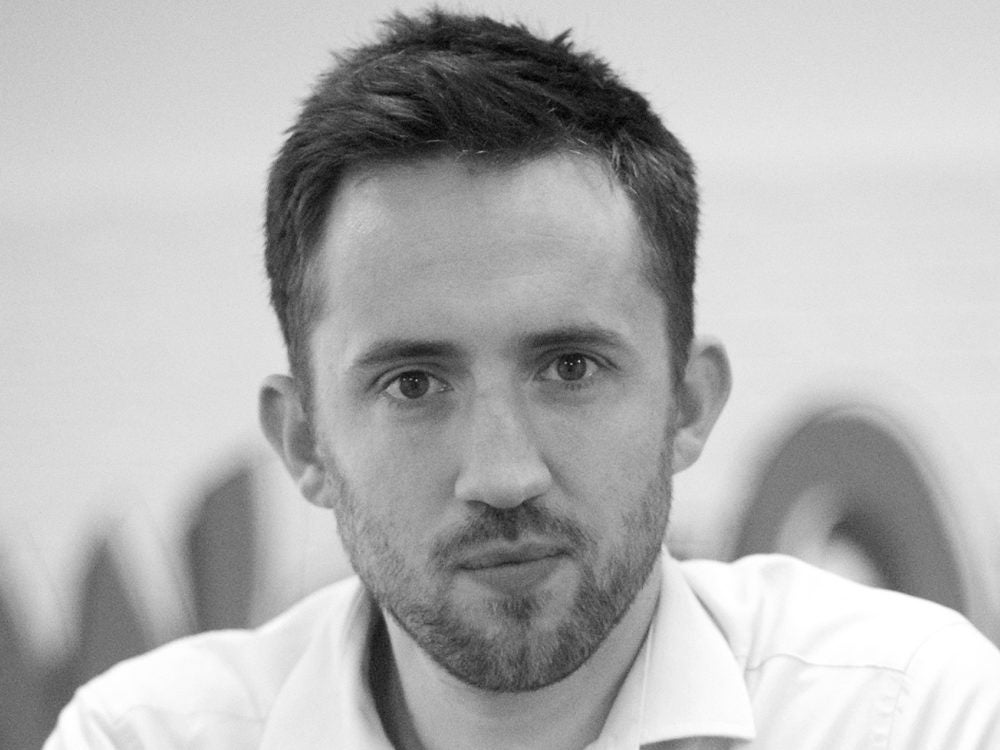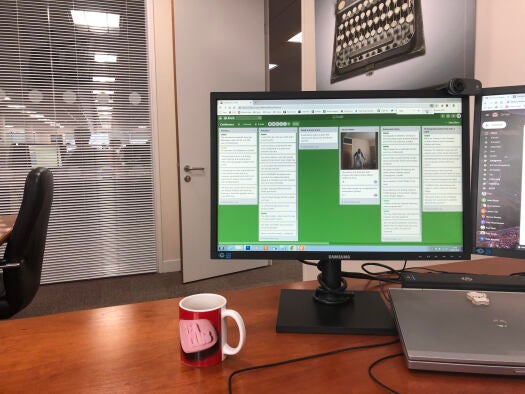
Wales Online editor Paul Rowland tells Press Gazette about the time Tommy Robinson turned up at his newsroom, his biggest mistake, and why the local news industry deserves better than “relentless pessimism”.
Rowland (pictured), who is also editor-in-chief of Media Wales (part of Mirror publisher Reach), completed a post-graduate diploma in newspaper journalism at Cardiff University before landing his first journalism job at the Western Mail in 2005.
What made you want to become a journalist?
This probably sounds a bit twee, but I’ve always loved the process of finding ways to bring a story to life. My primary school notebooks are filled with football match reports and front pages of made-up events. I can’t really remember making the decision that I wanted to be a journalist – it always felt like a done deal.
Where did you catch you first break?
I did a placement at The Times while I was at Cardiff and got handed a cutting from a local paper about a spate of road sign thefts.
I discovered that this was happening across the country, to the extent that the material being used for road signs was changing, and stickers were being put on the back of road signs on motorways to tell thieves there was no scrap value.
The editor really liked the story and it ran (I think) on page six – giving me a great cutting for my CV.
What was your first paying journalism job?
I joined the Western Mail as a trainee in July 2005 straight after finishing the Cardiff course. My family used to take the paper (and still do) and when Alan Edmunds, then editor, came to talk to our course about working there, I decided it was definitely where I wanted my first job to be.
Sadly I found out shortly afterwards they weren’t recruiting, but in the last couple of days of the course, Mark Tattersall, who split being a tutor on it with being assistant editor at the Mail, gave me a nudge and said: “There’s a job going. I think you really should apply.”
I found out I’d got it during the drinks reception to mark the end of the course.
What is it you enjoy most about journalism?
Knowing things that, by definition, other people want to find out. Seeing the impact a great story has. Now we work in a primarily digital setting, that’s more apparent than ever before. Social media can be a tough place when you’re a journalist, but seeing the response to doing something really big and getting it absolutely spot-on is pretty special.
Away from work, which newspapers, TV or radio news do you consume and why?
I love the social conscience and inclusion of Buzzfeed News and Huffington Post – there’s some mind-blowing journalism on both that sneering traditionalists could really do with getting over themselves and reading. After that it’s mainly specific journalists via social media.
As a random sample: Beth Rigby, Stephen Bush, Lewis Goodall, Esther Webber, Hadley Freeman, Jonathan Liew, Marina Hyde and Anna Kessel.
I’m also borderline obsessed with professional cycling so I’m always listening to The Cycling Podcast by Richard Moore, Lionel Birnie and Daniel Friebe, and have a subscription to Pro Cycling magazine.
What is the one thing you couldn’t do without as a journalist, and why?
A sense of purpose. Not in the “I’m here to change the world” sense, but a firm idea of what we’re all trying to achieve every day, how we’re going to do it, and why it needs to happen.
What piece of work are you most proud of, and why?
As a reporter, an interview I got with John Tulloch. He was a professor at Brunel University who was badly hurt in the 7/7 bombings, and a picture of him emerging from Edgware Road tube became one of the defining images of the atrocity.
A year or so later, he’d never spoken about his ordeal, but I tracked him down at his home in Penarth, just outside Cardiff, and managed to convince him to speak to me. We ended up sitting down for around two hours where he gave me the most astonishing moment-by-moment account of the blast, the aftermath and his recovery.
As an editor, I’d have to say our coverage of the 50th anniversary of the Aberfan disaster in 1966. I’d only taken over as editor a few months before, and I felt the burden of responsibility to do justice to such an unspeakable tragedy very acutely.
We agreed as a team that our storytelling needed to be in the words of those who had experienced the full horror of the disaster. What we delivered exceeded my most ambitious hopes.
What’s your biggest mistake / regret in your career?
This still sends a shiver down my spine when I mention it. About six years ago, I was running some training on a new live blogging platform we’d started to use. The session involved running a dummy breaking news blog about a made-up news event.
Everything was going fine until I got a call from downstairs: “Have you got any idea how we’re reporting that David Cameron has quit as Prime Minister?”. One of the team in the sessions had accidentally published their blog live on the site. Moments later, we’re trending nationally on social media. But these things always blow over, and happily, that one did.
What’s the most outrageous thing you’ve witnessed in a newsroom?
That would be when Tommy Robinson and a group of his heavies gained access to our Swansea newsroom to accost one of our journalists who’d described him as being of the “far right”. Because nothing proves you’re definitely not an extremist like travelling across the country with a group of henchmen to hound a journalist whose writing you didn’t like.
If you could change one thing about the UK media industry today, what would it be?
Aside from the culture where little to no monetary value is placed against the consumption of expert, professional journalistic content, my main bugbear is the tedious and incessantly negative narrative espoused about the regional press by politicians, industry commentators and, most disgracefully, the national media.
The way that the national titles’ media correspondents seem to revel in the difficulties of the regional press, never once including themselves as part of the problem or the solution, is especially galling. While they’re pontificating about the importance of strong local titles, at Reach and Media Wales we’re out there trying to provide them.
I’m not asking for blanket positivity – of course, there are serious issues that must be addressed – but we deserve better than such relentless pessimism when there are so many success stories.
Any top tips for aspiring journalists?
I see so many aspiring journalists pigeon-holing themselves before they’ve even started, either by deciding on their area of interest before even getting a job, or limiting themselves to working in a very specific part of the country. My advice would be to get as wide a range of experience as possible at the start of your career – there’s more than enough time to specialise later.
Can you show us a picture of your workspace?

Pictures: Media Wales
Email pged@pressgazette.co.uk to point out mistakes, provide story tips or send in a letter for publication on our "Letters Page" blog
